The Apple Seed Oil Market is estimated to be valued at USD 5.8 billion in 2025 and is projected to reach USD 8.6 billion by 2035, registering a compound annual growth rate (CAGR) of 4.0% over the forecast period.
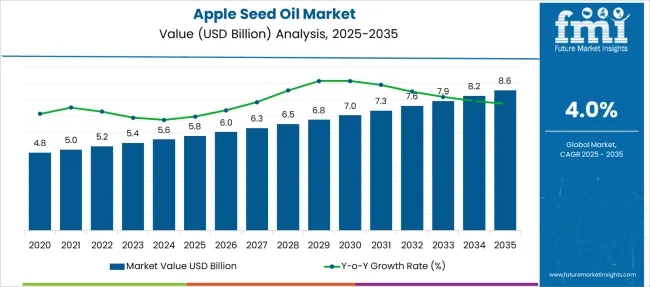
| Metric | Value |
|---|---|
| Apple Seed Oil Market Estimated Value in (2025 E) | USD 5.8 billion |
| Apple Seed Oil Market Forecast Value in (2035 F) | USD 8.6 billion |
| Forecast CAGR (2025 to 2035) | 4.0% |
The apple seed oil market is experiencing consistent expansion due to rising consumer awareness around natural ingredients, clean beauty formulations, and plant-based wellness solutions. The oil’s rich antioxidant profile, combined with its emollient and anti-inflammatory properties, has driven demand across skincare, haircare, and nutraceutical formulations.
The shift away from synthetic additives and mineral oils in both personal care and pharmaceutical industries has elevated the relevance of cold-pressed and minimally processed seed oils. Technological advancements in extraction methods and the promotion of sustainable sourcing practices are further supporting industry development.
Additionally, consumer preference for traceable, organically certified products is contributing to premiumization trends. As wellness-focused lifestyles continue to influence purchase behavior, apple seed oil is gaining traction as a multifunctional ingredient across a broad spectrum of end uses, from cosmetics to dietary supplements.
The market is segmented by Nature, Extraction Process, End-Use, Packaging, and Distribution Channel and region. By Nature, the market is divided into Organic and Conventional. In terms of Extraction Process, the market is classified into Solvent extraction and Cold-pressed. Based on End-Use, the market is segmented into Personal care cosmetics, Skincare, hair care, cosmeceuticals, homecare Products, and Household/Retail. By Packaging, the market is divided into Retail, Plastic Bottles, Glass bottles, and Bulk. By Distribution Channel, the market is segmented into Direct Channel, Indirect channel, Supermarket/Hypermarket, Specialty Stores, Modern Grocery Retail stores, and E-Retail. Regionally, the market is classified into North America, Latin America, Western Europe, Eastern Europe, Balkan & Baltic Countries, Russia & Belarus, Central Asia, East Asia, South Asia & Pacific, and the Middle East & Africa.
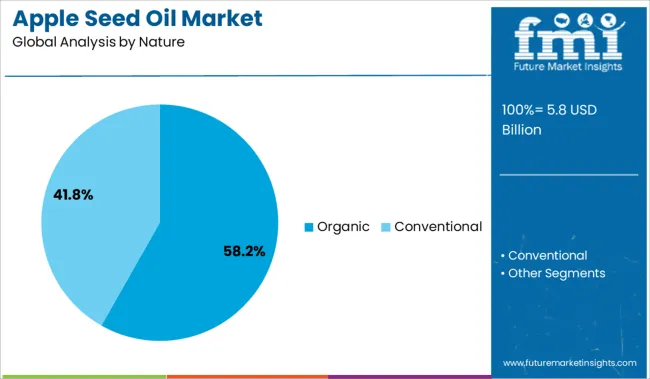
The organic nature segment is projected to represent 58.20% of the total market revenue by 2025, making it the most dominant category within the nature segment. This growth is driven by increasing consumer inclination toward chemical-free and sustainably sourced skincare and wellness products.
Organic apple seed oil is perceived as purer, safer, and more beneficial due to the absence of pesticides or synthetic additives during cultivation. Retailers and brands are actively expanding certified organic offerings to cater to environmentally conscious consumers seeking clean-label formulations.
Additionally, regulatory frameworks and third-party certifications validating organic claims have enhanced consumer trust. These factors have collectively positioned the organic segment at the forefront of the apple seed oil market.
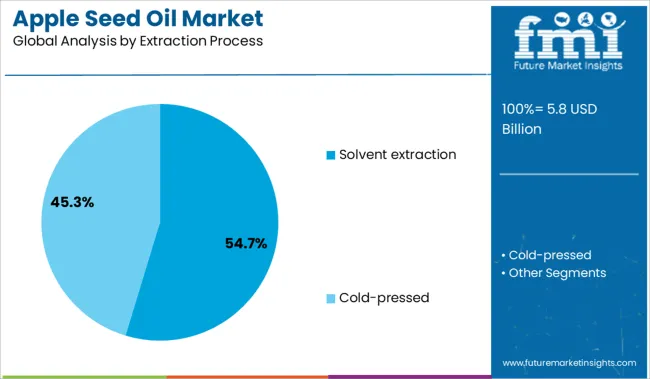
The solvent extraction process segment is expected to account for 54.70% of total revenue in 2025, emerging as the leading method in the extraction process category. This preference is due to its high oil yield, cost efficiency, and scalability in industrial applications.
Manufacturers favor solvent extraction to maximize output, particularly in high-volume production environments where raw material utilization and throughput are critical. Although cold-pressed oils are preferred for premium applications, solvent extraction continues to dominate due to its operational feasibility and ability to meet large-scale commercial demand.
Continued improvements in solvent removal and refining technologies have also contributed to the sustained use of this method.
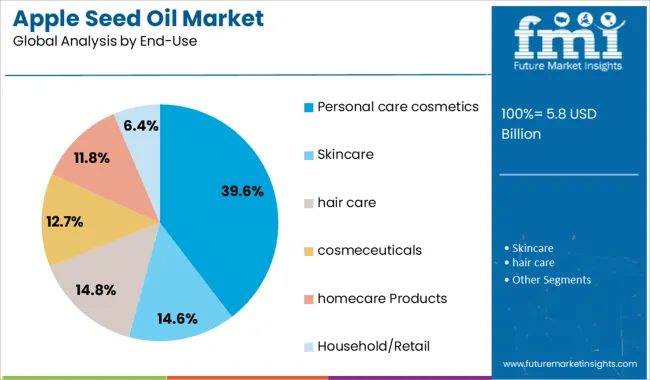
The personal care and cosmetics segment is projected to capture 39.60% of total market revenue by 2025, making it the largest end-use segment. The growth is driven by increasing demand for botanical actives and antioxidant-rich oils in skincare, haircare, and body care formulations.
Apple seed oil’s high linoleic acid, vitamin E, and phytosterol content make it a desirable ingredient in anti-aging, moisturizing, and restorative products. Consumer demand for natural and vegan beauty products is reinforcing the use of plant-based oils, particularly those with multifunctional skin benefits.
As cosmetic brands innovate with minimalist and ingredient-led product lines, apple seed oil continues to gain relevance, securing its leadership in the personal care segment.
The cosmeceuticals industry is expected to accrue significant benefits to the global apple seed oil market. The apple seed oil market is expected to witness significant growth in the near future. This is attributed to the increasing availability of these products across online stores and specialty stores.
Technological development in processing methods and new techniques are being developed to extract oil from apples. This will increase the demand for the market through forecasting years. Due to the increasing population, the demand for the personal care industry is high in the cosmetics industry.
Although the apple seed oil market has numerous end-uses, there are numerous obstacles that likely pose a challenge to market growth. The availability of other low-cost alternatives may hinder the growth of the apple seed oil market. With increasingly complex rules and regulations, apple seed oil manufacturing companies are focusing on producing creative and innovative products.
The high cost associated with the research and development activities and the availability of alternatives is anticipated to act as a significant growth barrier to the apple seed oil market in forthcoming years.
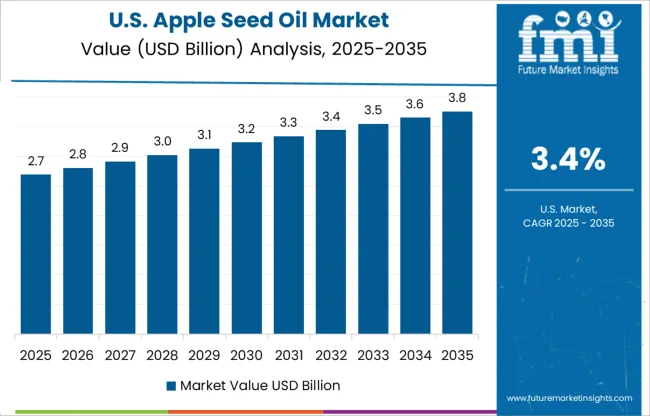
North America was the largest apple seed oil market and the trend is expected to continue into the forecast period owing to the high production of apples in the region. The growing demand for apple seed oil for medicinal purposes is expected to augment the apple seed oil market. The region is forecast to surge at over 7.5% CAGR from 2025 to 2035.
North America is expected to be the next dominant region witnessing high adoption rates for apple seed oil during the forecast period. With the rapid development and an increasing number of skin-related problems in North America demand for apple seed oil products is anticipated to rise in the region.
According to Future Market Insights, the Middle East and Africa are expected to provide immense growth opportunities for the apple seed oil market, due to the growing cosmetics industry in the region. Apple's seed oil market is expected to witness sustained growth over the forecast period. The growth of the apple seed oil market is driven by its wide applications in home care products.
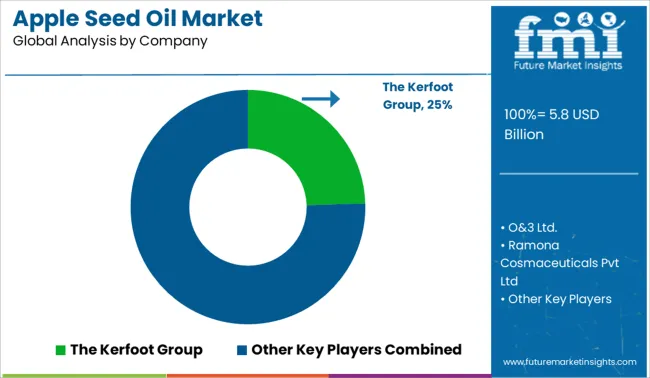
Some of the key participants present in the global Apple Seed Oil market include The Kerfoot Group, O&3 Ltd., Ramona Cosmaceuticals Pvt Ltd, Indrayan Seed Oil, MORRE-TEC Industries, Croda International Plc., Au Natural Organics., Organic Pure Oil Inc, SUYASH AYURVEDA, K.K ENTERPRISERS among others.
Attributed to the presence of such a high number of participants, the market is highly competitive. While global players such as The Kerfoot Group, O&3 LtdRamona Cosmaceuticals Pvt Ltd, and Indrayan Seed Oil, account for a considerable market size, several regional-level players are also operating across key growth regions, particularly in the Asia Pacific.
| Report Attribute | Details |
|---|---|
| Growth Rate | CAGR of 4% from 2025 to 2035 |
| Base Year for Estimation | 2024 |
| Historical Data | 2020 to 2024 |
| Forecast Period | 2025 to 2035 |
| Quantitative Units | Revenue in USD Million, Volume in Kilotons, and CAGR from 2025 to 2035 |
| Report Coverage | Revenue Forecast, Volume Forecast, Company Ranking, Competitive Landscape, Growth Factors, Trends, and Pricing Analysis |
| Segments Covered | Nature, Extraction Process, End-use, Distribution Channel, Packaging, Region |
| Regions Covered | North America; Latin America; Europe; Asia Pacific; Middle East and Africa |
| Key Countries Profiled |
USA, Canada, Brazil, Mexico, Germany, United Kingdom, France, Spain, Italy, China, Japan, South Korea, Malesia, Singapore, Australia, New Zealand, GCC Countries, South Africa, Israel |
| Key Companies Profiled | The Kerfoot Group; O&3 Ltd.; Ramona Cosmaceuticals Pvt Ltd; Indrayan Seed Oil; MORRE-TEC Industries; Croda International Plc.; Au Natural Organics.; Organic Pure Oil Inc; SUYASH AYURVEDA; K.K ENTERPRISERS |
| Customization | Available Upon Request |
The global apple seed oil market is estimated to be valued at USD 5.8 billion in 2025.
The market size for the apple seed oil market is projected to reach USD 8.6 billion by 2035.
The apple seed oil market is expected to grow at a 4.0% CAGR between 2025 and 2035.
The key product types in apple seed oil market are organic and conventional.
In terms of extraction process, solvent extraction segment to command 54.7% share in the apple seed oil market in 2025.






Our Research Products

The "Full Research Suite" delivers actionable market intel, deep dives on markets or technologies, so clients act faster, cut risk, and unlock growth.

The Leaderboard benchmarks and ranks top vendors, classifying them as Established Leaders, Leading Challengers, or Disruptors & Challengers.

Locates where complements amplify value and substitutes erode it, forecasting net impact by horizon

We deliver granular, decision-grade intel: market sizing, 5-year forecasts, pricing, adoption, usage, revenue, and operational KPIs—plus competitor tracking, regulation, and value chains—across 60 countries broadly.

Spot the shifts before they hit your P&L. We track inflection points, adoption curves, pricing moves, and ecosystem plays to show where demand is heading, why it is changing, and what to do next across high-growth markets and disruptive tech

Real-time reads of user behavior. We track shifting priorities, perceptions of today’s and next-gen services, and provider experience, then pace how fast tech moves from trial to adoption, blending buyer, consumer, and channel inputs with social signals (#WhySwitch, #UX).

Partner with our analyst team to build a custom report designed around your business priorities. From analysing market trends to assessing competitors or crafting bespoke datasets, we tailor insights to your needs.
Supplier Intelligence
Discovery & Profiling
Capacity & Footprint
Performance & Risk
Compliance & Governance
Commercial Readiness
Who Supplies Whom
Scorecards & Shortlists
Playbooks & Docs
Category Intelligence
Definition & Scope
Demand & Use Cases
Cost Drivers
Market Structure
Supply Chain Map
Trade & Policy
Operating Norms
Deliverables
Buyer Intelligence
Account Basics
Spend & Scope
Procurement Model
Vendor Requirements
Terms & Policies
Entry Strategy
Pain Points & Triggers
Outputs
Pricing Analysis
Benchmarks
Trends
Should-Cost
Indexation
Landed Cost
Commercial Terms
Deliverables
Brand Analysis
Positioning & Value Prop
Share & Presence
Customer Evidence
Go-to-Market
Digital & Reputation
Compliance & Trust
KPIs & Gaps
Outputs
Full Research Suite comprises of:
Market outlook & trends analysis
Interviews & case studies
Strategic recommendations
Vendor profiles & capabilities analysis
5-year forecasts
8 regions and 60+ country-level data splits
Market segment data splits
12 months of continuous data updates
DELIVERED AS:
PDF EXCEL ONLINE
Apple Accessories Market Report – Demand, Trends & Forecast 2025–2035
Apple Cider Vinegar Market Analysis - Size, Share, and Forecast Outlook 2025 to 2035
Seed Paper Bag Market Size and Share Forecast Outlook 2025 to 2035
Seed Processing Equipment Market Size and Share Forecast Outlook 2025 to 2035
Seed Treatment Materials Market Size and Share Forecast Outlook 2025 to 2035
Seed Biostimulants Market Size and Share Forecast Outlook 2025 to 2035
Seed Health Market Size and Share Forecast Outlook 2025 to 2035
Seed Additives Market Analysis - Size and Share Forecast Outlook 2025 to 2035
Seed Coating Material Market Analysis - Size, Share, and Forecast 2025 to 2035
Seed Packaging Market Analysis – Growth & Forecast 2025 to 2035
Seed Binders Market Analysis - Size, Share & Forecast 2025 to 2035
Market Share Breakdown of Seed Cracker Manufacturers
Seed Polymer Market
Seed Testing Services Market Growth – Trends & Forecast 2018-2028
Teaseed Cake Market – Trends & Forecast 2025 to 2035
The Linseed Oil Market is Analysis by Nature, Product Type, Application, and Region from 2025 to 2035
Rapeseed Protein Market Size and Share Forecast Outlook 2025 to 2035
Flaxseed Gum Market Size and Share Forecast Outlook 2025 to 2035
Analysis and Growth Projections for Hempseed Milk Business
Rapeseed Meal Market Analysis by Type, Application, Nature, and Region Through 2035

Thank you!
You will receive an email from our Business Development Manager. Please be sure to check your SPAM/JUNK folder too.
Chat With
MaRIA